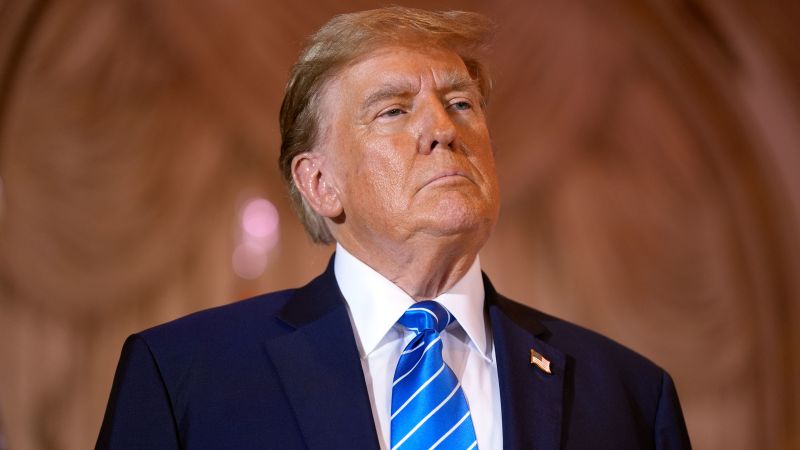Donald Trump’s attorneys accused Manhattan District Attorney Alvin Bragg of a pursuing a “fantasy” case against the former president by tying hush-money payments made to his former attorney Michael Cohen with the 2016 election.
“The People must attempt to try the case they charged, not the case the District Attorney fantasized about when he was on the campaign trial,” Trump’s attorneys wrote in a reply brief to Judge Juan Merchan, who is considering pre-trial motions ahead of Trump’s New York criminal trial slated to begin on March 25.
Both Trump’s lawyers and the district attorney’s office have urged the judge to exclude testimony and arguments from the other side. Trump is seeking to disqualify testimony from Cohen, as well as evidence related to other alleged “catch and kill” schemes Trump’s circle executed ahead of the 2016 presidential election.
In their filing Wednesday, Trump’s lawyers claimed that the Democratic district attorney has crafted “a fanciful and elaborate narrative that does not exist,” by connecting the charges against Trump for falsified business records with an attempt to influence the 2016 election.
“The case the People charged is a lawless 34-count indictment relating to record entries reflecting monthly retainer payments President Trump made to his personal attorney Michael Cohen in 2017,” Trump’s attorneys wrote. “The People’s motions in limine, on the other hand, describe a fantasy: an uncharged ‘underlying conspiracy’ to ‘influence the 2016 election’ that the District Attorney wishes President Trump had not won.
Trump was charged last year with 34 counts of falsified business records reimbursements made to Cohen, who issued hush-money payments to adult film star Stormy Daniels before the 2016 election to stop her from going public about an alleged affair with Trump a decade earlier. Trump has pleaded not guilty to the charges and denied the affair.
Trump was charged with felonies, not misdemeanors, under New York law because the prosecutors alleged that the falsified business records were used to conceal another crime, which they said could include state and federal election laws or tax laws. Merchan previously denied Trump’s motion to dismiss the indictment, finding the evidence was legally sufficient to support the charge.
Still, Trump’s attorneys are trying to limit what can go before the jury when the trial begins later this month.
Trump’s lawyers argued in his pretrial motion last month that the alleged payments made to Daniels and Karen McDougal could not be considered Federal Election Campaign Act (FECA) violations because they were not campaign contributions and were not made with the purpose of influencing the election. McDougal was paid by American Media Inc., which publishes the National Enquirer.
In their response brief, Bragg’s team says Trump’s arguments that the payment to Daniels didn’t violate election laws “simply represents his disagreement with FECA and the FEC’s regulations.”
In a filing on Tuesday, the district attorney said Trump’s attempt to disqualify Cohen as a witness was “unprecedented” and unwarranted. Prosecutors said they expect Cohen to give truthful testimony at the upcoming trial that will be corroborated by evidence and other witnesses.
Trump and his legal team asked Merchan to bar Cohen from testifying because he’s committed perjury more than once, including they said at Trump’s civil fraud trial last fall. (Cohen was not charged with perjury in that trial.)
In Wednesday’s filing, Trump’s lawyers wrote that they should be allowed to cross-examine Cohen on several issues about his credibility that the district attorney objects to, including “federal prosecutors’ written representations to two federal judges that Cohen lied to them.”
“The Court should reserve judgment on the admissibility of the statements in those filings until President Trump confronts Cohen and decides whether and to what extent he will seek to offer the filings based on Cohen’s answers,” Trump’s attorneys wrote.
Trump’s lawyers also asked the judge to block prosecutors from showing the notorious 2005 “Access Hollywood” tape. Bragg’s office noted that the tape was allowed into evidence at E. Jean Carroll’s federal defamation case against Trump, ruling it “is uniquely probative” of Trump’s state of mind.
Trump’s lawyers argued that the tape “would be unduly prejudicial and confusing to the jury.”
“The highly prejudicial contents of the recording of a 2005 conversation have no place at this trial about business records entries in 2017,” Trump’s attorneys wrote. “The People focus on the timing of the ‘release’ of the recording in proximity to the 2016 election and the alleged payment to Clifford, which is not a basis for admitting the recording’s highly prejudicial contents.”
Read the full article here



